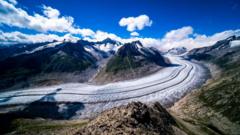The world’s glaciers, critical freshwater resources for millions, are disappearing at an alarming rate. A recent study shows they've lost over 6,500 billion tonnes of ice since 2000, with losses soaring more than a third compared to previous years.
The Aletsch Glacier, the largest in the European Alps, illustrates this as it has retreated by 3.2 km since 1900, and over 1 km just since 2000. Glaciers, or frozen rivers of ice, are crucial indicators of climate change, shrinking worldwide as temperatures rise primarily due to human activities like burning fossil fuels.
Between 2000 and 2023, glaciers outside major ice-sheets have lost about 270 billion tonnes of ice annually—enough to meet global water consumption for 30 years, according to the lead researcher, Michael Zemp.
In just 20 years, Central Europe has seen a staggering 39% decline in glacier ice. The study, published in *Nature*, consolidates various measurement methods to provide a clearer picture of this crisis, boosting confidence in its findings among scientists and policymakers.
Despite glaciers taking time to react to climate shifts, the future of these ice reserves depends heavily on humanity's emissions of greenhouse gases. A continued increase in global temperatures could lead to a catastrophic loss of nearly half the world’s glacier ice by century's end, while meeting climate targets could limit losses to a quarter.
Glacier decline doesn't just affect local scenery; approximately hundreds of millions rely on them for seasonal meltwater, serving as buffers against drought disasters. The potential rise in global sea levels could also exacerbate flooding, threatening millions of people along coastlines.
As Prof Shepherd reminds us, every centimeter of sea-level rise could expose an additional 2 million individuals to yearly flooding risks. With global sea levels already up by more than 20 cm since 1900—half since the 90s—urgency is mounting to address these environmental challenges.




















